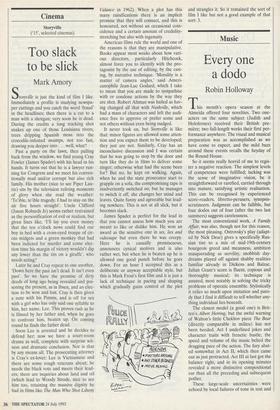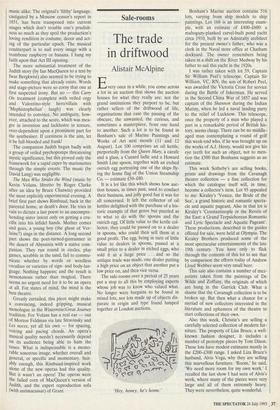Music
Every one a dodo
Robin Holloway
This month's opera season at the Almeida offered four novelties. Two one- acters on the same subject (Judith and Holofernes) received their British pre- miere; two full-length works their first per- formance anywhere. The visual and musical preparation was as accomplished as we have come to expect, and the mild buzz around these events recalls the heyday of the Round House.
So it seems really horrid of me to regis- ter a negative reaction. The simplest levels of competence were fulfilled; lacking was the sense of imaginative vision, be it straightforward or rarefied, carried through into mature, satisfying artistic realisation. This can be recognised by experienced score-readers, libretto-perusers, synopsis- scrutineers. Judgment can be fallible, but four dodos out of four (after the two last summers) suggests carelessness.
The most conventional work, A Family Affair, was also, though not for this reason, the most pleasing. Ostrovsky's play (adapt- ed by Nick Dear) gives a specifically Rus- sian tint to a mix of mid-19th-century bourgeois greed and meanness, ambition masquerading as servility, snobbish day- dreams played off against shabby realities familiar already in Dickens and Balzac. Julian Grant's score is fluent, copious and thoroughly musical; its technique is assured, most notably in solving the tricky problems of operatic ensemble. Stylistically it relies so much upon imitation and paro- dy that I find it difficult to tell whether any- thing individual lies beneath.
The closest model (a good one) is Brit- ten's Albert Herring, but the awful warning of Walton's little Chekhov piece The Bear (directly comparable in milieu) has not been heeded. Act I underlined jokes and character traits with frenetic bustle; the speed and volume of the music belied the dragging pace of the action. The fury abat- ed somewhat in Act II, which then came out as just protracted. Act III at last got the balance right, and in its opening minutes revealed a more distinctive compositional ear than all the preceding and subsequent pother.
These large-scale uncertainties were echoed by local failures of tone in text and music alike. The original's 'filthy' language, castigated by a Moscow censor's report in 1851, has been transposed into current usages which don't trouble one's prudish- ness so much as they spoil the production's loving rendition in costume, decor and act- ing of the particular epoch. The musical counterpart is to nail every image with a trombone raspberry or banana. I hang my faith upon that Act III opening.
The more substantial treatment of the Judith story (by Ian MacQueen to a text by Iwar Bergkwist) also seemed to be trying to make something that already exists. Words and stage-picture were so corny that one at first suspected irony. But no — this Cony On treatment (complete with veiled orgy and Valentino-style hero/villain with `Mephistophelian' laugh) was clearly intended to convince. No ambiguity, how- ever, attached to the score, which was mea- gre in invention and lacklustre in texture, over-dependent upon a prominent part for the synthesiser. If corniness is the aim, let it be full-blooded and frank!
The companion Judith began badly with a group of veiled psychopomps threatening mystic significance, but this proved only the framework for a rapid caper by marionettes through the simple events. The music (by David Lang) was negligible.
The Man Who Strides the Wind (music by Kevin Volans, libretto by Roger Clarke after an idea by Bruce Chatwin) provided the most explicitly experimental evening. A brief first part shows Rimbaud, back in the parental home, at death's door. He tries in vain to dictate a last poem to an uncompre- hending sister intent only on getting a cru- cifix into his infidel hands. Mother comes and goes, a young boy (the ghost of Ver- laine?) sings in the distance. A long second part shows the poet-turned-gunrunner in the desert of Abyssinia with a native com- panion. They run round in circles, play games, scrabble in the sand, fail to commu- nicate whether by words or wordless vocalises or varieties of sign- and body-lan- guage. Nothing happens; and the result is monotonous rather than magical. There seems no urgent need for it to be an opera at all. For states of mind, the mind is the best theatre.
Greatly curtailed, this piece might make a convincing, indeed gripping, musical monologue in the WinterreiselGreat Journey tradition. For Volans has a real ear — out of Morton Feldman via late Stravinsky and Les noces, yet all his own — for spacing, voicing and pacing chords. An opera's musical quality needn't necessarily depend on its audience being able to hum the tunes. What is indispensable is a memo- rable sonorous image, whether overall and general, or specific and momentary. Suit- ably enough, this Rimbaud-inspired work alone of the new operas had this quality. But it wasn't an opera! The operas were the failed corn of MacQueen's version of Judith, and the expert reproduction sofa (with antimacassar) of Grant.



















































 Previous page
Previous page